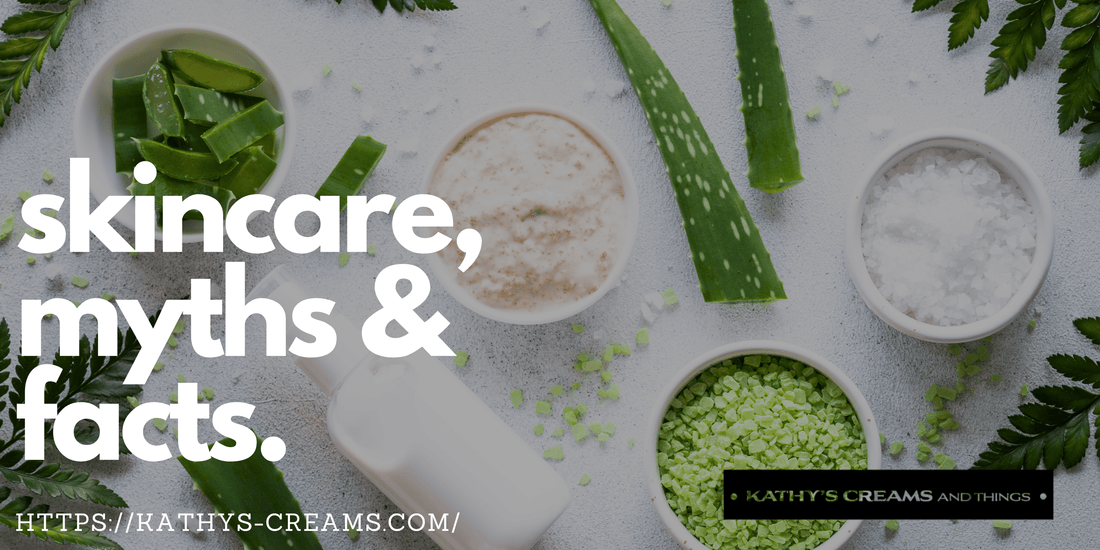
Natural Skincare: Myths, Facts, and What You Should Know
Share
Have you ever been intrigued by the idea of using natural skincare products? If yes, you're not alone! There's recently been a huge surge of interest in all things "natural" and for many good reasons. However, with a plethora of information out there, it can be tough to distinguish between what's fact and what's fiction. In this post, we're going to dispel common myths surrounding natural skincare and provide you with the facts, so you can make informed choices when it comes to your skincare routine.
Myth: Natural skincare products don't work as well as their chemical-laden counterparts.
Fact: While it's true that some natural ingredients may take longer to show results, this doesn't mean that they're less effective. In fact, natural ingredients such as aloe vera and tea tree oil have been shown to have potent antibacterial and anti-inflammatory properties that can potentially improve acne, soothe irritated skin, and reduce redness. Plus, natural products are often gentler on the skin than harsh synthetic chemicals, making them a great option for those with sensitive skin.
Myth: All natural skincare is safe to use.
Fact: While natural ingredients are generally safe, it's essential to remember that not everything that comes from nature is harmless. For example, poison ivy is an entirely natural plant, but that doesn't mean that it's safe to use on the skin. Additionally, some natural ingredients can be irritating or allergenic for certain individuals. Therefore, always do a patch test before using a new product, and if you have any questions or concerns, consult with your dermatologist.
Myth: The term "natural" on skincare labels means the product is entirely chemical-free.
Fact: Unfortunately, this isn't always the case. The term "natural" isn't regulated by the FDA, so any company can use it on their labels regardless of other ingredients included. An ingredient could be derived from a natural source, but it may still undergo chemical processing before making its way into a product. Therefore, it's essential to read the ingredient list carefully and research any unfamiliar ones.
Myth: Natural products are always more expensive than synthetic ones.
Fact: While some natural skincare products may be on the pricey side, this isn't always the case. Many natural ingredients can be sourced relatively inexpensively, making natural skincare products affordable for all budgets. Additionally, making your skincare products at home can also save you money while allowing you to customize your ingredients to your skincare needs.
Myth: Natural skincare is just a passing fad.
Fact: The trend towards natural skincare is here to stay, mainly as people become more aware of the potential risks of using synthetic chemicals on their skin. Therefore, it's crucial to stay informed about natural skincare and the ingredients that are beneficial to the skin while avoiding any myths or misinformation that may lead to harmful product choices.
In conclusion, natural skincare can offer many benefits to the skin, but it's important to be aware of the myths surrounding it to make informed choices. Always read the labels carefully, research unfamiliar ingredients, and consult with a dermatologist if you have any concerns. By doing so, you can incorporate natural skincare into your routine safely and effectively.
Myth: Natural skincare products don't work as well as their chemical-laden counterparts.
Fact: While it's true that some natural ingredients may take longer to show results, this doesn't mean that they're less effective. In fact, natural ingredients such as aloe vera and tea tree oil have been shown to have potent antibacterial and anti-inflammatory properties that can potentially improve acne, soothe irritated skin, and reduce redness. Plus, natural products are often gentler on the skin than harsh synthetic chemicals, making them a great option for those with sensitive skin.
Myth: All natural skincare is safe to use.
Fact: While natural ingredients are generally safe, it's essential to remember that not everything that comes from nature is harmless. For example, poison ivy is an entirely natural plant, but that doesn't mean that it's safe to use on the skin. Additionally, some natural ingredients can be irritating or allergenic for certain individuals. Therefore, always do a patch test before using a new product, and if you have any questions or concerns, consult with your dermatologist.
Myth: The term "natural" on skincare labels means the product is entirely chemical-free.
Fact: Unfortunately, this isn't always the case. The term "natural" isn't regulated by the FDA, so any company can use it on their labels regardless of other ingredients included. An ingredient could be derived from a natural source, but it may still undergo chemical processing before making its way into a product. Therefore, it's essential to read the ingredient list carefully and research any unfamiliar ones.
Myth: Natural products are always more expensive than synthetic ones.
Fact: While some natural skincare products may be on the pricey side, this isn't always the case. Many natural ingredients can be sourced relatively inexpensively, making natural skincare products affordable for all budgets. Additionally, making your skincare products at home can also save you money while allowing you to customize your ingredients to your skincare needs.
Myth: Natural skincare is just a passing fad.
Fact: The trend towards natural skincare is here to stay, mainly as people become more aware of the potential risks of using synthetic chemicals on their skin. Therefore, it's crucial to stay informed about natural skincare and the ingredients that are beneficial to the skin while avoiding any myths or misinformation that may lead to harmful product choices.
In conclusion, natural skincare can offer many benefits to the skin, but it's important to be aware of the myths surrounding it to make informed choices. Always read the labels carefully, research unfamiliar ingredients, and consult with a dermatologist if you have any concerns. By doing so, you can incorporate natural skincare into your routine safely and effectively.
